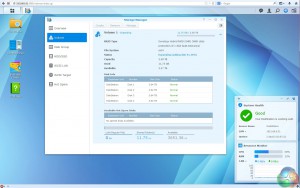
Plug in the power and network cable, turn the NAS on and wait until the flashing LEDs have settled down. Installing DSM 5 takes about ten minutes, however the process of checking the RAID array took 60 hours or two and a half days. If there is an option for disabling error checking then I couldn't see it anywhere and had no choice but to let the process continue as it diligently checked my shiny new WD Red drives.
DSM 5 is the latest version of Synology's NAS Operating System but you don't have to rush out and buy a new Synology if you fancy an upgrade as DSM 5 is supported by all Synology NAS from 2010 to the current day.
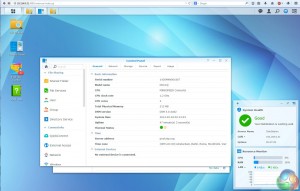
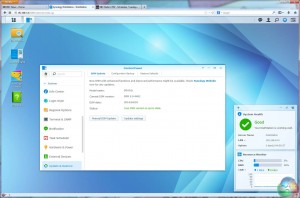
When the process was finished I had a healthy row of green LEDs (ignore the missing LAN LED in the photo as I moved the NAS to take the picture).
As you can see the hardware consists of the dual core Mindspeed Comcerto processor along with 512MB of DDR3 memory.
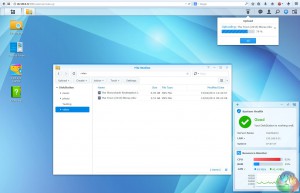
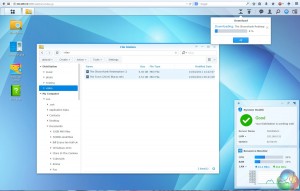
Uploading 10GB of movies in two files gave me an average speed of 30.5MBps and downloading those same files ran at 67.3MBps. Those figures are comparable with the budget DS214se and slower than the DS214, but of course the DS414j has the extra workload of RAID 5 to deal with.
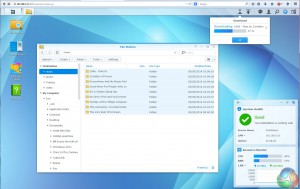
Working with 500MB of music files that are arranged in folders slowed things down significantly. The upload speed was 4.4MBps and download was 14.8MBps which is very close to the DS214 and while the figures sound low they are perfectly acceptable for that sort of work.
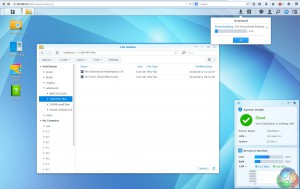
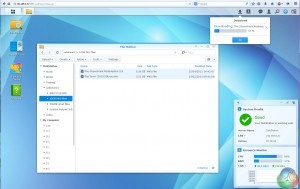
Downloading the same 10GB of files from a USB flash drive plugged in to the DS414j confirmed that USB 3.0 is indeed faster than USB 2.0 with respective speeds of 42.8MBps and 26.7MBps. Interestingly I could see no mechanism for directly transferring files from a USB drive to the SATA array so you would need to download from USB to a local machine and then upload to the RAID array.
I have rushed through the testing as the figures confirm that the DS414j performs perfectly adequately and in line with its J budget designation.
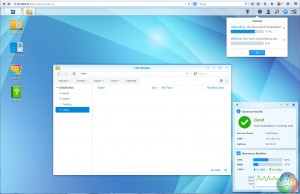
What I haven't told you is how I tested the DS414j. Initially I connected the NAS to my home network which has a Virgin Super Hub at the centre, as that is how I would use it in the real world. When I came to move files around the network the results were awful.
Transferring 10GB of movies took twice as long as the figures mentioned above but moving 500MB of small files was a different league of terrible. Instead of taking 33.8 seconds the test actually took longer than 11 minutes which is less than 1MBps.
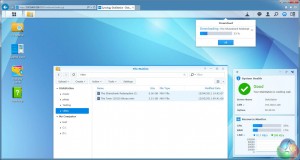
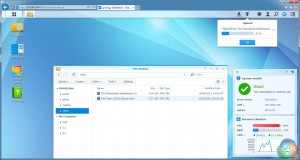
I knew the Synology couldn't be to blame so I grabbed an old D-Link DI-724GU router and connected the Synology and a single PC. The result was network speeds that made sense and file transfers that worked exactly as I would expect with movie uploads at 30.8MBps and downloads at 63.5MBps.
So what the heck was wrong with my home network? The Internet connection here is fine and no-one has any obvious problems yet the Synology was clearly unhappy. I rebooted the Virgin Super Hub which, despite its name, is a very average Netgear router.
When I opened my preferred browser Firefox to connect with the Synology I was faced with a Java plug-in permission request. Firefox had updated itself to version 29 four days previously so this didn't appear to be related to the latest Firefox update but something was clearly going on.

I investigated the Plug-ins in my browser and came up with with this rather worrying message which says that current versions of the Java plug-in are reported as vulnerable to security flaws. This leads Firefox to attempt to block Java and this must surely have an impact on Synology as the Control Panel runs on Java.
This isn't a cast iron explanation but I can see why my PC and the home network all behave nicely yet the Synology suffered terribly at first. My advice here is to check your router, check your browser and check your connection speeds.
 KitGuru KitGuru.net – Tech News | Hardware News | Hardware Reviews | IOS | Mobile | Gaming | Graphics Cards
KitGuru KitGuru.net – Tech News | Hardware News | Hardware Reviews | IOS | Mobile | Gaming | Graphics Cards


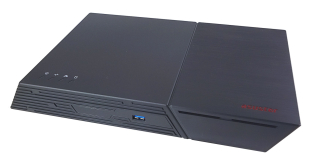
Thanks for the review!
However, according to their product page (http://www.synology.com/en-global/products/spec/DS414j) it actually is SATA 3 (6Gbit/s).
You test nas from dsm web? Why not samba? Web transfer speeds are obviously lower…